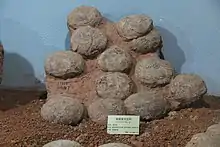Faveoloolithus
Faveoolithus is an oogenus of dinosaur egg. The oogenus contains two oospecies, F. ningxiaensis and F. zhangi.[1]
| Faveoloolithus | |
|---|---|
 | |
| Faveoloolithus sp. eggs, Henan Geological Museum | |
| Egg fossil classification | |
| Basic shell type: | †Dinosauroid-spherulitic |
| Oofamily: | †Faveoloolithidae |
| Oogenus: | †Faveoloolithus Zhao & Ding, 1976 |
| Oospecies | |
| |
Distribution
Fossil eggs of Faveoolithus have been found in:[1]
- Chahanaobao and the Turonian Gaogou Formation, China
- Campanian Barun Goyot Formation, Mongolia
- Santonian Seonso Conglomerate, South Korea
See also
References
- Faveoolithus at Fossilworks.org
Bibliography
- M. Huh and D. K. Zelenitsky. 2002. Rich dinosaur nesting site from the Cretaceous of Bosung County, Chullanam-do Province, South Korea. Journal of Vertebrate Paleontology 22(3):716-718
- Carpenter, K. 1999. Eggs, Nests, and Baby Dinosaurs: A Look at Dinosaur Reproduction (Life of the Past). Indiana University Press, Bloomington, Indiana
- K. Mikhailov, K. Sabath, and S. Kurzanov. 1994. Eggs and nests from the Cretaceous of Mongolia. In K. Carpenter, K. F. Hirsch, and J. R. Horner (eds.), Dinosaur Eggs and Babies, Cambridge University Press, Cambridge 88-115
- Z.-K. Zhao. 1994. In K. Carpenter, K. F. Hirsch, and J. R. Horner (eds.), Dinosaur Eggs and Babies, Cambridge University Press, Cambridge. In K. Carpenter, K. F. Hirsch, and J. R. Horner (eds.), Dinosaur Eggs and Babies, Cambridge University Press, Cambridge 184-203
- Z. Zhao and S. Ding. 1976. [Discovery of the dinosaurian egg-shells from Alxa, Ningxia and its stratigraphical significance]. Vertebrata PalAsiatica 14(2):42-44
This article is issued from Wikipedia. The text is licensed under Creative Commons - Attribution - Sharealike. Additional terms may apply for the media files.